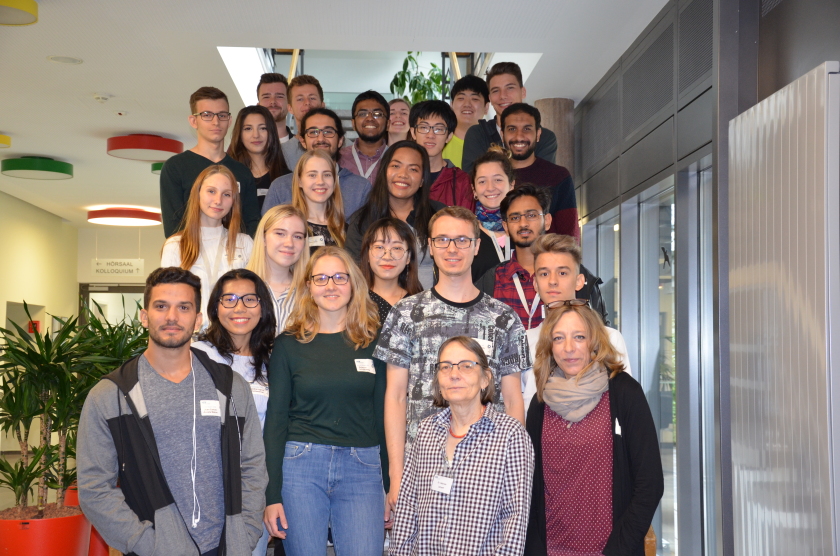Summer in the laboratory: 24 students from all over the world start their summer project

Group picture at arrival day at HZB. © S. Kodalle/HZB
For eight weeks the summer students are now working on a research project at the Helmholtz Centre Berlin. Experienced scientists of the HZB will support them. On Thursday, 30 August, they will present their results.
This year, 282 young people from all over the world applied to take part in the HZB's summer program. But only 24 places are available. Now the selected students can start their project. They come from 14 different countries, including Egypt, China, Cuba, Russia and Thailand, and study STEM subjects in Bachelor's or Master's programmes at their home universities. For many, the summer student program is the first step into research.
"Once again this year, many HZB researchers have signed up with project ideas for summer students and agreed to intensively support the students," says Gabriele Lampert, who coordinates the summer student program. "I know that this also means additional work, but the experience from recent years also shows that it is often worth it for both sides. Because it happens again and again that summer students come back later, for example for a doctorate, as cooperation partners or users.
Finally, the summer students will present their results on 30 August 2019 at 11:00. Three students will give a short lecture, all others will explain their project with a self-designed poster.
arö
https://www.helmholtz-berlin.de/pubbin/news_seite?nid=20621;sprache=en
- Copy link
-
Humboldt-Fellow at HZB-Institute for Solar Fuels: Alexander R. Uhl
Alexander R. Uhl, UBC Okanagan School of Engineering in Kelowna, Canada, aims to develop with Roel van de Krol from the HZB Institute for Solar Fuels an efficient and inexpensive photoelectrolyser for producing hydrogen using sunlight. His stay is being funded by the Alexander von Humboldt Foundation.
-
What Zinc concentration in teeth reveals
Teeth are composites of mineral and protein, with a bulk of bony dentin that is highly porous. This structure is allows teeth to be both strong and sensitive. Besides calcium and phosphate, teeth contain trace elements such as zinc. Using complementary microscopy imaging techniques, a team from Charité Berlin, TU Berlin and HZB has quantified the distribution of natural zinc along and across teeth in 3 dimensions. The team found that, as porosity in dentine increases towards the pulp, zinc concentration increases 5~10 fold. These results help to understand the influence of widely-used zinc-containing biomaterials (e.g. filling) and could inspire improvements in dental medicine.
-
Element cobalt exhibits surprising properties
The element cobalt is considered a typical ferromagnet with no further secrets. However, an international team led by HZB researcher Dr. Jaime Sánchez-Barriga has now uncovered complex topological features in its electronic structure. Spin-resolved measurements of the band structure (spin-ARPES) at BESSY II revealed entangled energy bands that cross each other along extended paths in specific crystallographic directions, even at room temperature. As a result, cobalt can be considered as a highly tunable and unexpectedly rich topological platform, opening new perspectives for exploiting magnetic topological states in future information technologies.
